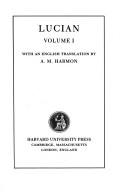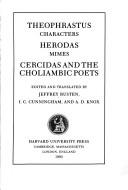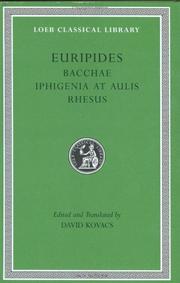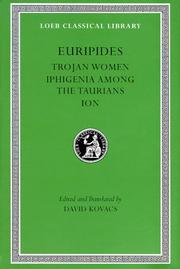| Listing 1 - 10 of 16 | << page >> |
Sort by
|

ISBN: 0674990153 9780674990609 9780674991446 0674991796 9780674993334 9780674994744 9780674994751 9780674994768 Year: 1913 Publisher: Cambridge, Mass : Harvard University Press,
Abstract | Keywords | Export | Availability | Bookmark
 Loading...
Loading...Choose an application
- Reference Manager
- EndNote
- RefWorks (Direct export to RefWorks)
Lucian (ca. 120-190 CE), the satirist from Samosata on the Euphrates, started as an apprentice sculptor, turned to rhetoric and visited Italy and Gaul as a successful travelling lecturer, before settling in Athens and developing his original brand of satire. Late in life he fell on hard times and accepted an official post in Egypt. Although notable for the Attic purity and elegance of his Greek and his literary versatility, Lucian is chiefly famed for the lively, cynical wit of the humorous dialogues in which he satirises human folly, superstition and hypocrisy. His aim was to amuse rather than to instruct. Among his best works are A True Story (the tallest of tall stories about a voyage to the moon), Dialogues of the Gods (a 'reductio ad absurdum' of traditional mythology), Dialogues of the Dead (on the vanity of human wishes), Philosophies for Sale (great philosophers of the past are auctioned off as slaves), The Fisherman (the degeneracy of modern philosophers), The Carousal or Symposium (philosophers misbehave at a party), Timon (the problems of being rich), Twice Accused (Lucian's defence of his literary career) and (if by Lucian) The Ass (the amusing adventures of a man who is turned into an ass). The Loeb Classical Library edition of Lucian is in eight volumes.
Mythology, Greek --- Drama. --- Greece --- Character sketches. --- Epic poetry.
Book
ISBN: 0809118726 Year: 1975 Publisher: New York (N.Y.): Paulist Press
Abstract | Keywords | Export | Availability | Bookmark
 Loading...
Loading...Choose an application
- Reference Manager
- EndNote
- RefWorks (Direct export to RefWorks)
Moral education. --- Moral education --- Character education --- Ethical education --- Child rearing --- Education --- Ethics --- Religious education

ISBN: 067499244X 9780674992443 Year: 1993 Volume: 225 Publisher: Cambridge (MA) ; London : Harvard University Press,
Abstract | Keywords | Export | Availability | Bookmark
 Loading...
Loading...Choose an application
- Reference Manager
- EndNote
- RefWorks (Direct export to RefWorks)
Character sketches --- Cynics (Greek philosophy) --- Greek literature --- Pantomimes --- Portraits (Littérature) --- Cyniques (Philosophie grecque) --- Littérature grecque --- Poetry --- Translations into English --- Poésie --- Traductions anglaises --- Character sketches. --- Pantomimes. --- 880 --- Balkan literature --- Byzantine literature --- Classical literature --- Classical philology --- Greek philology --- Cynic (Greek philosophy) --- Cynicism (Greek philosophy) --- Cynicism --- Philosophy, Ancient --- Tableaux --- Literature Greek and Classical literatures --- Portraits (Littérature) --- Littérature grecque --- Poésie --- Greek literature - Translations into English. --- Cynics (Greek philosophy) - Poetry.

ISBN: 0674995333 9780674995338 Year: 1995 Volume: 484 2 Publisher: Cambridge (Mass.) : Harvard university press,
Abstract | Keywords | Export | Availability | Bookmark
 Loading...
Loading...Choose an application
- Reference Manager
- EndNote
- RefWorks (Direct export to RefWorks)
Euripides (c. 485-406 BCE) has been prized in every age for his emotional and intellectual drama. Eighteen of his ninety or so plays survive complete, including Medea, Hippolytus, and Bacchae, one of the great masterpieces of the tragic genre. Fragments of his lost plays also survive.
Hippolytus (Greek mythology) --- Andromache (Legendary character) --- Hecuba (Legendary character) --- Mythology, Greek --- Drama. --- -Andromache (Legendary character) --- Greek mythology --- Drama --- Euripides --- -Translations into English --- Translations into English. --- Greek drama (Tragedy) --- Greek drama (Satyr play) --- Greek drama --- Mythology, Greek, in literature --- Tragedy --- Andromache --- Hecuba, --- Heracles --- Hippolytus --- Satyric drama, Greek --- Hipòlit --- Hipolitas --- Hipólito --- Hippolütosz --- Hippolyte --- Hippolytos --- Ippolito --- Ippolitu --- 威耳比俄斯 --- Іпполіт --- Хиполит --- Ипполит --- ヒッポリュトス --- هيبوليتوس --- Ἱππόλυτος --- Alcaeus --- Alcides --- Alkaios --- Alkeidēs --- Earcail --- Eracle --- Eracles --- Heracle --- Herakl --- Heraklej --- Hēraklēs --- Héraklész --- Heraklis --- Herakliu --- Heraklo --- Hērakls --- Héthacl'ye --- 赫拉克勒斯 --- ヘーラクレース --- הרקולס --- 헤라클레스 --- Херакле --- Херакъл --- Гэракл --- Геракл --- هرکول --- هيراكليس --- Ἀλκείδης --- Ἀλκαῖος --- Ἡρακλῆς --- Ecuba, --- Hecabe, --- Hécube, --- Hekaba, --- Hekabē, --- Hekabo, --- Hekuba, --- 赫库芭, --- ヘカベー, --- הקובה, --- 헤카베, --- Гекаба, --- Гекуба, --- Хекаба, --- Хекуба, --- هکابه, --- هيكوبا, --- Ἑκάβη, --- Ėvripid --- Yūrībīdīs --- Euripide --- Euripedes --- Eŭripido --- Eurypides --- Euripidesu --- אוריפידס --- エウリーピデース --- Εὐριπίδης --- Andromache, --- Andrómaca --- Andromacha --- Andromaha --- Andromahi --- Andromaka --- Andromakhe --- Andrómakka --- Andromaque --- 安德洛玛刻 --- アンドロマケー --- 안드로마케 --- Андромаха --- Андрамаха --- آندروماخه --- أندروماكا --- Ἀνδρομάχη --- Greek literature --- Dionysia --- Hercules --- Euripides - Translations into English. --- Hippolytus (Greek mythology) - Drama. --- Andromache (Legendary character) - Drama. --- Hecuba (Legendary character) - Drama. --- Mythology, Greek - Drama. --- Tragedies. - gsafd --- Hippolytus (Greek mythology) - Drama
Book
ISBN: 3402047926 9783402047927 Year: 2003 Volume: 44 Publisher: Münster Aschendorff
Abstract | Keywords | Export | Availability | Bookmark
 Loading...
Loading...Choose an application
- Reference Manager
- EndNote
- RefWorks (Direct export to RefWorks)
Bible --- Wisdom (Biblical personification) --- Wisdom --- Religious aspects --- Christianity. --- Judaism. --- 225 <082> --- Bijbel: Nieuw Testament--Feestbundels. Festschriften --- Festschrift - Libri Amicorum --- Experience --- Intellect --- Learning and scholarship --- Reason --- Ḥokhmah (Biblical personification) --- Sophia (Biblical personification) --- Wisdom (Biblical character) --- Personification in the Bible --- Religious aspects&delete& --- Christianity --- Judaism --- Criticism, interpretation, etc. --- Biblia --- Wisdom - Religious aspects - Christianity. --- Wisdom - Religious aspects - Judaism.

ISBN: 0674996011 9780674996014 Year: 2002 Volume: 495 Publisher: Cambridge (Mass.) : Harvard university press,
Abstract | Keywords | Export | Availability | Bookmark
 Loading...
Loading...Choose an application
- Reference Manager
- EndNote
- RefWorks (Direct export to RefWorks)
Euripides (c. 485-406 BCE) has been prized in every age for his emotional and intellectual drama. Eighteen of his ninety or so plays survive complete, including Medea, Hippolytus, and Bacchae, one of the great masterpieces of the tragic genre. Fragments of his lost plays also survive.
Rhesus (Legendary character) --- Iphigenia (Greek mythology) --- Pentheus (Greek mythology) --- Dionysus (Greek deity) --- Trojan War --- Bacchantes --- Euripides --- Rhesus, --- Dionysus --- Mythology, Greek --- Maenads --- Cults --- Dionysia --- Greek drama (Satyr play) --- Greek drama (Tragedy) --- Greek drama --- Mythology, Greek, in literature --- Tragedy --- Iphigenia --- Pentheus, --- Greek mythology --- Satyric drama, Greek --- Resas, --- Reso, --- Resos, --- Rhēsos, --- Ῥῆσος, --- Рес, --- Рез, --- Резос, --- Рэс, --- 레소스, --- レーソス, --- Penthée, --- Πενθεύς, --- Τενθεύς, --- Tentheus, --- Ifigeneia --- Ifigenia --- Ifigenija --- Ifigjenia --- Ifixenia --- Iphigeneia --- Iphigenie --- 伊菲革涅亚 --- イーピゲネイア --- איפיגניה --- 이피게네이아 --- Іфігенія --- Ифигенија --- Ифигения --- إيفيجينيا --- Ἰφιγένεια --- Ėvripid --- Yūrībīdīs --- Euripide --- Euripedes --- Eŭripido --- Eurypides --- Euripidesu --- אוריפידס --- エウリーピデース --- Εὐριπίδης --- Bacchus --- Bakchos --- Dionís --- Dionisas --- Dioniso --- Dionīss --- Dionisu --- Dioniz --- Dionizi --- Dionizo --- Dionizos --- Dionüszosz --- Dionysos --- Dionýzos --- Diyonizosse --- Διόνυσος --- Дионис --- ديونيسوس --- 디오니소스 --- דיוניסוס --- ディオニューソス --- 狄俄倪索斯 --- Βάκχος --- Діоніс --- Drama --- Greek literature --- Drama. --- Rhesus (Legendary character) - Drama. --- Iphigenia (Greek mythology) - Drama --- Pentheus (Greek mythology) - Drama. --- Dionysus (Greek deity) - Drama. --- Trojan War - Drama. --- Bacchantes - Drama. --- Bacchantes - Drama --- Euripides - Translations into English --- Rhesus, - King of Thrace (Legendary character) - Drama --- Dionysus - (Greek deity) - Drama --- Rhesus, - King of Thrace (Legendary character) --- Dionysus - (Greek deity)
Book
ISBN: 9024275091 9789024275090 Year: 1985 Publisher: Kampen Kok Agora
Abstract | Keywords | Export | Availability | Bookmark
 Loading...
Loading...Choose an application
- Reference Manager
- EndNote
- RefWorks (Direct export to RefWorks)
37.017 --- Moral education --- -Christian education --- -#GBIB:SMM --- #GBIB:CBMER --- #GSDBP --- #GGSB: Moraal - Algemeen --- Education, Christian --- Religious education --- Theology, Practical --- Spiritual formation --- Theology --- Character education --- Ethical education --- Child rearing --- Education --- Ethics --- Opvoedingsidealen --- Study and teaching --- Christian education --- Lerarenopleiding --- algemeen --- algemeen. --- 37.017 Opvoedingsidealen --- #GBIB:SMM --- Moraal - Algemeen

ISBN: 0674995740 9780674995741 Year: 1999 Volume: 4 10 Publisher: Cambridge (Mass.) : Harvard university press,
Abstract | Keywords | Export | Availability | Bookmark
 Loading...
Loading...Choose an application
- Reference Manager
- EndNote
- RefWorks (Direct export to RefWorks)
Euripides (c. 485-406 BCE) has been prized in every age for his emotional and intellectual drama. Eighteen of his ninety or so plays survive complete, including Medea, Hippolytus, and Bacchae, one of the great masterpieces of the tragic genre. Fragments of his lost plays also survive.
Greek drama (Tragedy) --- Trojan War --- Languages & Literatures --- Greek & Latin Languages & Literatures --- Translations into English --- -Hecuba (Legendary character) --- -Ion (Greek mythology) --- -Iphigenia (Greek mythology) --- -Trojan War --- -Translations into English --- Drama --- Euripides --- -Mythology, Greek --- -Euripides --- Euripide --- Hecuba (Legendary character) --- Ion (Greek mythology) --- Iphigenia (Greek mythology) --- Translations into English. --- Drama. --- Bacchantes --- Cassandra (Legendary character) --- Helen of Troy (Greek mythology) --- Queens --- Royalty --- Rulers --- Sovereigns --- Maenads --- Hecuba, --- Ion --- Iphigenia --- Ifigeneia --- Ifigenia --- Ifigenija --- Ifigjenia --- Ifixenia --- Iphigeneia --- Iphigenie --- 伊菲革涅亚 --- イーピゲネイア --- איפיגניה --- 이피게네이아 --- Іфігенія --- Ифигенија --- Ифигения --- إيفيجينيا --- Ἰφιγένεια --- Ió --- Iōnas --- Ione --- Jonas --- 伊昂 --- 이온 --- Јон --- Іон --- Йон --- إيون --- Ἴων --- Ἰωνας --- Ecuba, --- Hecabe, --- Hécube, --- Hekaba, --- Hekabē, --- Hekabo, --- Hekuba, --- 赫库芭, --- ヘカベー, --- הקובה, --- 헤카베, --- Гекаба, --- Гекуба, --- Хекаба, --- Хекуба, --- هکابه, --- هيكوبا, --- Ἑκάβη, --- Ėvripid --- Yūrībīdīs --- Euripedes --- Eŭripido --- Eurypides --- Euripidesu --- אוריפידס --- エウリーピデース --- Εὐριπίδης --- Turkey --- Ilion (Extinct city) --- Ilium (Extinct city) --- Middle East --- Troia (Extinct city) --- Troja (Extinct city) --- Trovaharabesi (Extinct city) --- Troy --- Monarchy --- Women --- Courts and courtiers --- Empresses --- Kings and rulers --- Mythology, Greek --- Cults --- Dionysia --- Greek drama (Tragedy) - Translations into English. --- Hecuba (Legendary character) - Drama --- Iphigenia (Greek mythology) - Drama. --- Ion (Greek mythology) - Drama. --- Trojan War - Drama --- Hecuba, Queen of Troy

ISBN: 3110170078 3110879980 9783110170078 Year: 2014 Volume: 304 Publisher: Berlin ; Boston : De Gruyter,
Abstract | Keywords | Export | Availability | Bookmark
 Loading...
Loading...Choose an application
- Reference Manager
- EndNote
- RefWorks (Direct export to RefWorks)
223.4 --- Boek der Spreuken --- Bible--Femmes --- Bible--Women --- Bijbel--Vrouwen --- Femmes dans la Bible --- Moeders--Bijbelleer --- Mothers--Biblical teaching --- Mères--Enseignement biblique --- Sagesse (Personnification biblique) --- Vrouwen in de Bijbel --- Wijsheid (Bijbelse personificatie) --- Wisdom (Biblical personification) --- Women in the Bible --- Bible. O.T. Proverbs I-IX --- Criticism, interpretation, etc --- Bible. O.T. Proverbs XXI, 10-31 --- Women in the Bible. --- Bible. --- Criticism, interpretation, etc. --- Ḥokhmah (Biblical personification) --- Sophia (Biblical personification) --- Wisdom (Biblical character) --- Personification in the Bible
Book
ISBN: 9789033476310 9033476312 Year: 2010 Publisher: Leuven Acco
Abstract | Keywords | Export | Availability | Bookmark
 Loading...
Loading...Choose an application
- Reference Manager
- EndNote
- RefWorks (Direct export to RefWorks)
History of civilization --- Job --- Job (Biblical character) --- Job (Bijbelse figuur) --- Job (Personnage de la bible) --- In literature --- lijden --- bijbel --- godsdienst --- Academic collection --- C1 --- Oud Testament --- interpretatie (x) --- literatuur --- muziek --- kunst --- #GGSB: Exegese O.T. --- #GGSB: Tekstkritiek O.T. --- #GGSB: Wijsheidsliteratuur --- Kerken en religie --- #GGSB: Exegese O.T --- #GGSB: Tekstkritiek O.T --- Ayyūb --- Eyyüb --- Giobbe --- Hiob --- Ijob --- Iyov --- Job, --- Nabi Ajub --- איוב --- איוב (דמות מקראית) --- In literature. --- Exegese O.T --- Tekstkritiek O.T --- Wijsheidsliteratuur --- #gsdb1 --- Job - (Biblical figure) - In literature --- Job - (Biblical figure) - Art --- Job - (Biblical figure) - Musical settings --- Job - (Biblical figure)
| Listing 1 - 10 of 16 | << page >> |
Sort by
|

 Search
Search Feedback
Feedback About UniCat
About UniCat  Help
Help News
News